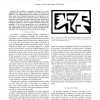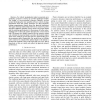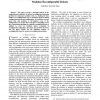135
click to vote
ICRA
2010
IEEE
15 years 20 days ago
2010
IEEE
— We propose a novel peer-to-peer distributed control architecture for shared haptic collaboration among remotely-located users over undirected packet-switching network (e.g. Int...
ICRA
2010
IEEE
15 years 20 days ago
2010
IEEE
— We consider a navigation problem for a robot equipped with only a map, compass, and contact sensor. In addition to the limitations placed on sensing, we assume that there exist...
ICRA
2010
IEEE
15 years 20 days ago
2010
IEEE
Abstract— For robotic manipulation tasks in uncertain environments, good force control can provide significant benefits. The design of force-controlled actuators typically revo...
135
Voted
ICRA
2010
IEEE
15 years 20 days ago
2010
IEEE
— Data collection using Autonomous Underwater Vehicles (AUVs) is increasing in importance within the oceanographic research community. Contrary to traditional moored or static pl...
ICRA
2010
IEEE
15 years 20 days ago
2010
IEEE
— What would humans be like if nature had invented the wheel? Golem Krang is a novel humanoid torso designed at Georgia Tech. The robot dynamically transforms from a .5 m
ICRA
2010
IEEE
15 years 20 days ago
2010
IEEE
Abstract— In this paper we study online gait optimization for modular robots. The learning strategy we apply is distributed, independent on robot morphology, and easy to implemen...
ICRA
2010
IEEE
15 years 20 days ago
2010
IEEE
— Aerial robots are often required to remain within the communication range of a base station on the ground to exchange commands, sensor data or as a safety mechanism. For this...
121
click to vote
ICRA
2010
IEEE
15 years 20 days ago
2010
IEEE
— To provide personal and location-dependent services in public spaces such as shopping malls, it is important to be able to estimate the positions and identities of people in th...
117
click to vote
ICRA
2010
IEEE
15 years 20 days ago
2010
IEEE
Abstract— We present an active vision system for segmentation of visual scenes based on integration of several cues. The system serves as a visual front end for generation of obj...
ICRA
2010
IEEE
15 years 20 days ago
2010
IEEE
— This paper presents a thorough analysis of the computational complexity of optimal reconfiguration planning problem for chain-type modular robots, i.e. finding the least number...



